1 - Expected post-Chinafy results
Exploring the Benefits of Using a CDN for Your Website in China
In this article, we will explore the fundamentals of CDN, the benefits it offers, the obstacles it faces in China, and the role of Chinafy as a website optimization tool tailored for the Chinese market.
What is a CDN?
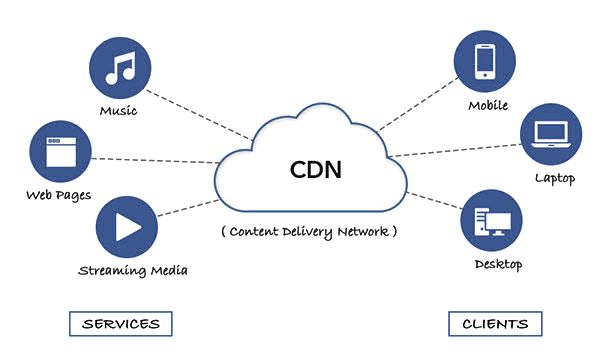
Image Source: Plesk
A Content Delivery Network (CDN) is a network of geographically distributed servers designed to enhance the delivery of web content to users. The primary objective is to reduce latency, optimize load times, and enhance the overall performance of websites. CDNs work by strategically caching static content, such as images, scripts, and stylesheets, on servers located closer to the end-users, thereby reducing the time it takes for content to reach them.
Benefits of Using a CDN
Improved Loading Speeds
By distributing content across servers worldwide, CDNs significantly reduce the time it takes for users to access a website. This is particularly important for businesses targeting global audiences, as faster loading speeds contribute to a positive user experience and can impact search engine rankings.
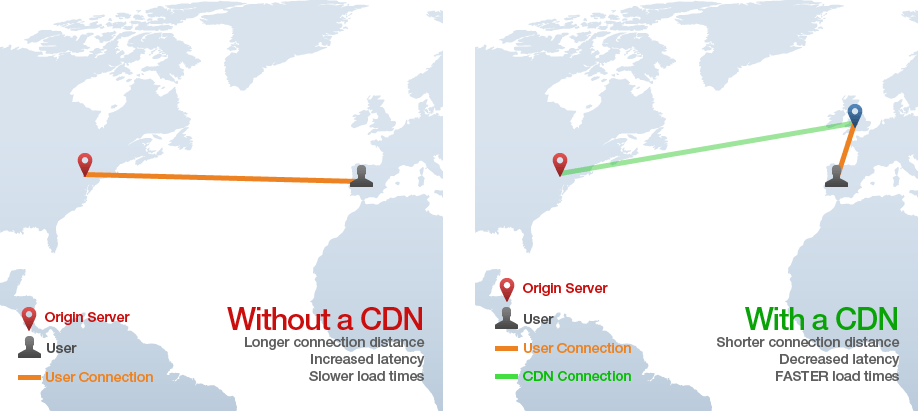
Image Source: GTMetric
Global Scalability
CDNs allow websites to scale globally without sacrificing performance. As traffic increases, CDNs can handle the load efficiently by distributing it across multiple servers. This scalability is essential for businesses experiencing growth and expanding their reach to new markets.
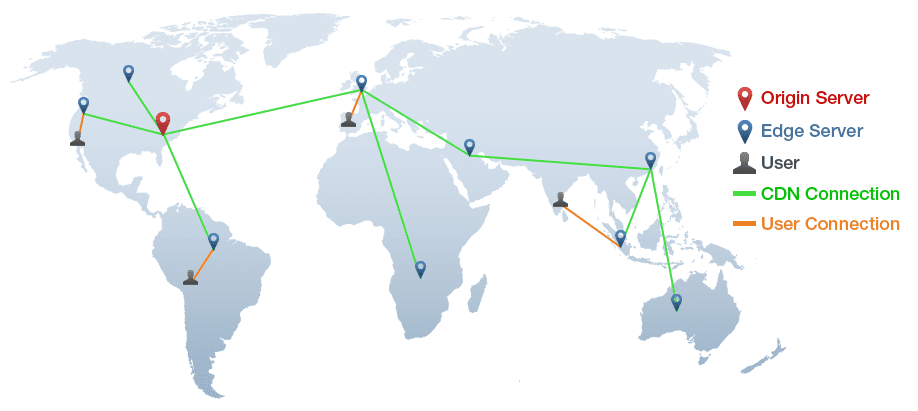
Image source: GTMetrics
CDNs make sure users download data from the nearest servers.
Enhanced Reliability and Uptime
CDNs enhance the reliability of a website by providing redundancy. If one server experiences issues, another can seamlessly take over, minimizing downtime and ensuring continuous accessibility for users.
Security and DDoS Protection
CDNs offer an additional layer of security by providing protection against Distributed Denial of Service (DDoS) attacks. This is crucial for safeguarding websites from malicious activities and ensuring uninterrupted service.
This feature can track IP addresses, headers, and URL parameters, gather statistics on occurrences, status codes, and request methods, and block malicious access requests. Using this information, CDNs ensure that regular business traffic remains unaffected. To counter network-layer DDoS attacks, CDNs can be integrated with anti-DDoS products. In distribution scenarios, CDNs are employed for effective protection against DDoS attacks by detecting targeted areas and redirecting attack traffic to the Anti-DDoS Scrubbing Center.
Cost Efficiency
CDNs can reduce bandwidth costs by caching and delivering content more efficiently.
Web hosting companies bill based on the data transferred to and from the origin server, known as bandwidth. When a website caches its content with a CDN, less data needs to be transferred from the origin server, reducing bandwidth costs.
This efficiency leads to cost savings for businesses, making CDNs a valuable investment in terms of both performance and economics.
Is Using CDN Enough to Make Your Website Work in China?
No. CDNs alone are not sufficient to achieve a fast, full, and securely delivered website in China. This is because CDNs by nature cannot address software-layer resource compatibility issues that websites encounter in China across blocked, inaccessible, or simply slow-loading 3rd party resources
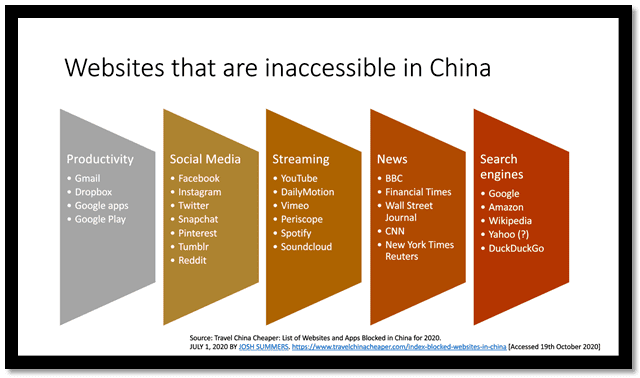
Examples of inaccessible websites in China. The list is incomplete and evolving given the nature of platforms and web resources in China. Image source: sussex
A website usually consists of hundreds of components known as resources. These can include visible elements like images, Instagram embeds, Facebook Like widgets, or Google Maps. There are also less noticeable components such as JavaScript, fonts, Recaptcha, or analytics trackers. In many cases, several of these resources are blocked in China, and most of them fail to load due to slow servers or networks.
Read more on “Why websites don't work in China”
How to Optimise CDNs for your website in China
Chinafy is the only China web compatibility solution that identifies, modifies, and substitutes incompatible resources to ensure they load quickly and completely in China. It also identifies slow resources and accelerates them as needed.
This is why most Chinafy users come even after adding a CDN onto their website and vice versa.
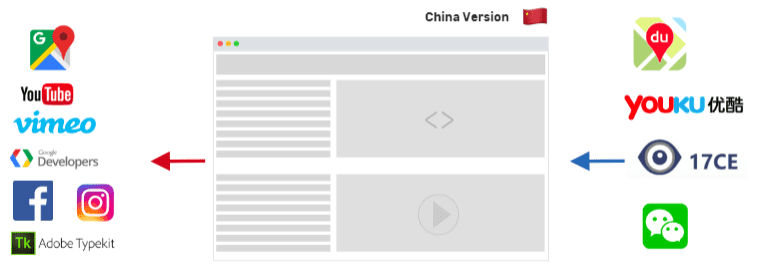
Chinafy isn't a CDN itself, but includes a fully-managed CDNs (onshore or offshore*) part of the platform in partnership with thoroughly tested leading global CDN providers for optimal China performance.
Read more about how not all CDNs perform the same in China as they do elsewhere here.
*different pre-requisites must be met for use of different CDN platforms.
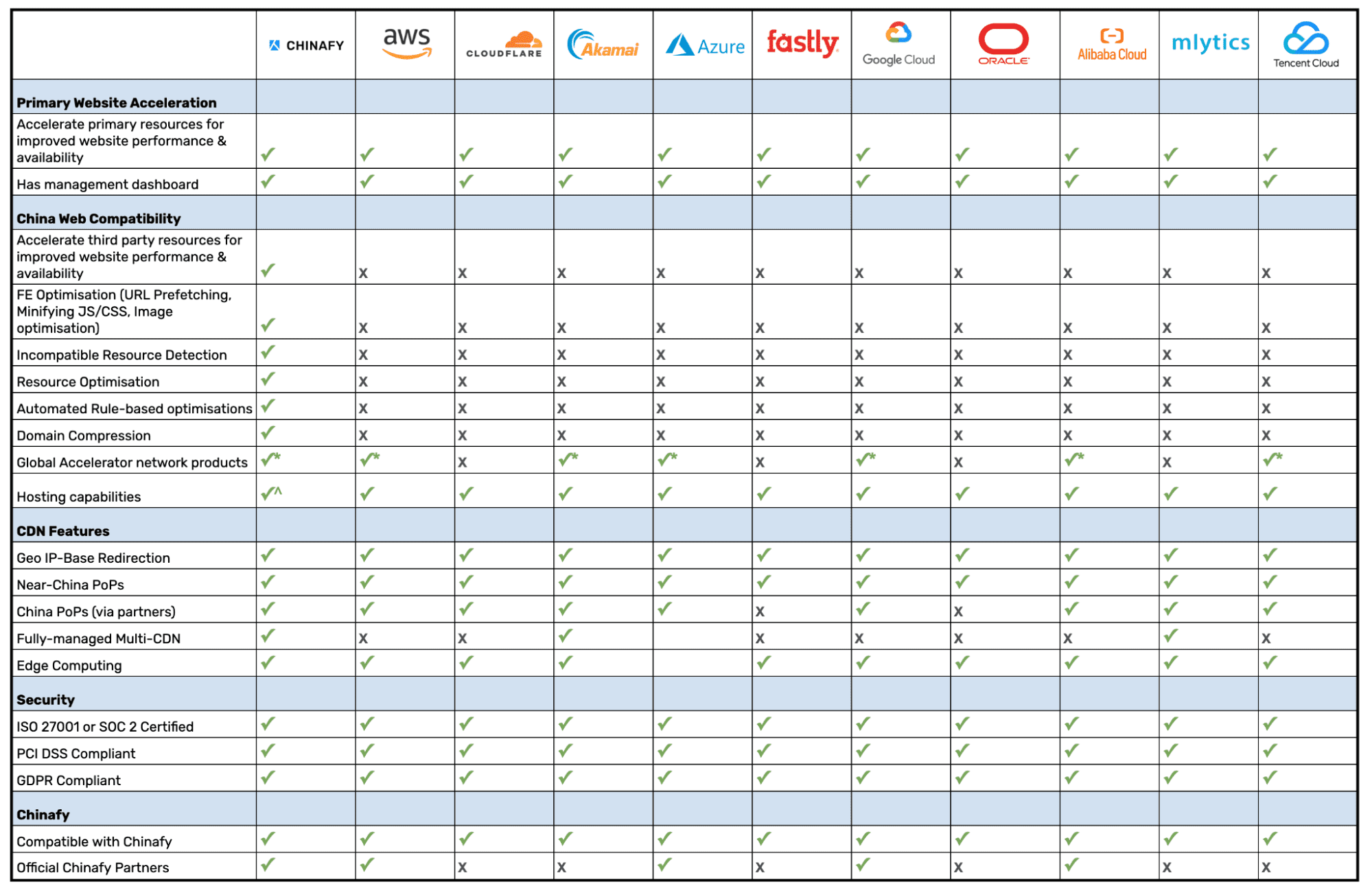
Related articles:
Chinafy for AWS CloudFront CDN
How Chinafy works:
Chinafy produces a 'China-specific' version of your site using the publicly accessible HTML, CSS, and JS of your original site. This mirrored version is then handled and modified by Chinafy, ensuring that your original site and its SEO remain unaffected.
Chinafy's Smart Actions feature employs rule-based suggestions to address approximately 75% of the most blocked or slow resources. It replaces them with Chinese equivalents or removes those that are blocked without a China-replacement, ensuring it doesn't impact the functionality of the rest of the website. Expert engineers then set custom optimisation rules should there be additional items requiring additional support.
Chinafy then automatically adds top-notch infrastructure for your Chinafy site. This includes hosting, load balancers to manage traffic changes, domain compression, and content delivery networks (CDNs) near China, chosen for their competitive edge through thousands of performance tests.
The Chinafy version is automatically updated to match your original site, ensuring that any changes are processed and reflected accordingly. Enterprise Chinafy users also benefit from ongoing change management where automated updates might not apply to custom configurations and modifications made to their website.
Check out “CDN or Chinafy? Which One Do You Need?”
With Chinafy, websites are 30%-40% faster compared to using CDNs near China alone, as it addresses resource compatibility issues that impact the loading process.
Ready to optimize your website for China? Click Get Started to evaluate your website with Chinafy



1 - Expected post-Chinafy results






























